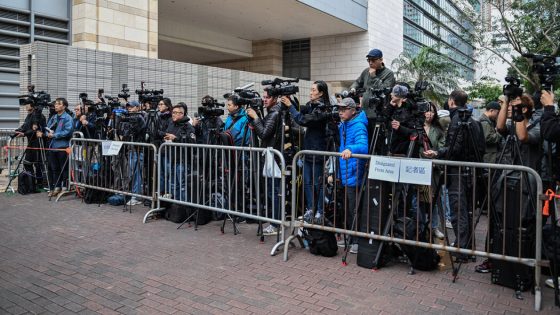The United States-funded news service Radio Free Asia said on Friday that it has closed its office in Hong Kong because of concerns about the city’s recently enacted national security law that targets so-called foreign interference.
Hong Kong’s new national security law, which was passed with unusual speed earlier this month, raised “serious questions about our ability to operate in safety,” the broadcaster’s president and chief executive, Bay Fang, said in a statement. Radio Free Asia said that it had relocated some employees from Hong Kong to Taiwan, the United States, or elsewhere, and laid others off.
The authorities in China have long accused Radio Free Asia, also known as R.F.A., of being a front for the U.S. government. In its statement, the news organization noted that officials in Hong Kong had also recently referred to R.F.A. as a “foreign force” in the context of how it covered the discussion over the new security law.
Hong Kong enacted the security law on March 23, giving the city’s authorities more power to investigate such offenses as “external interference” and the theft of state secrets. The city’s officials, including its security chief, Chris Tang, have insisted that freedoms would be protected and the law would only target national security threats.The government declined a request to comment on Radio Free Asia’s departure, pointing instead to national security laws in other countries to justify legislation in Hong Kong.
“To single out Hong Kong and suggest that journalists would only experience concerns when operating here but not in other countries would be grossly biased, if not outrageous,” a government spokesman said in an emailed statement.
But advocates of press freedom say the laws significantly raise the risks for journalists operating in the city. Its vague definition of external interference can be broadly applied to regular journalistic work, the activists say.
Hong Kong’s status as one of Asia’s most vibrant capitals of free and independent media has eroded precipitously since Beijing imposed a sweeping crackdown on the city in response to antigovernment protests that erupted there in 2019.
In 2020, China directly imposed a national security law on the city that effectively silenced dissent there. Newsrooms were raided and editors arrested, forcing the closure of Apple Daily, a popular pro-democracy newspaper, as well as smaller, independent outlets such as Stand News and Citizen News.
The founder of Apple Daily, Jimmy Lai, is currently on trial on national security charges and is accused of masterminding the 2019 demonstrations. Two senior editors for Stand News are also on trial, accused of publishing what the authorities have called seditious material, which includes profiles of pro-democracy activists.
The government also imposed an overhaul of Radio Television Hong Kong, a public broadcaster that once was known for reporting critically on officials; programs were canceled and staff members replaced.
This year, as Hong Kong moved swiftly to pass its own security laws, the Hong Kong Journalists Association warned of a chilling effect. Leaks from government sources regarding personnel changes, financial budgets, police investigations and other matters in the public interest could be subject to national security laws, the group warned.
Officials say those concerns are misplaced and that there are sufficient safeguards in the laws to protect regular reporting.
In the past months, the Hong Kong government has taken a far more adversarial stance against foreign media. Officials have lashed out about a guest essay published in The New York Times and an editorial by The Washington Post, as well as news articles by the BBC and Bloomberg about the national security legislation, describing the reports as scaremongering. (In 2020, The Times announced it would relocate its Hong Kong-based digital news operation to Seoul after the first security law was imposed.)
Cédric Alviani, the Asia-Pacific bureau director of Reporters Without Borders, said Hong Kong’s national security laws are placing pressure on local journalists to censor themselves to avoid crossing the government’s “blurry red lines.”
“What we’re seeing is the Chinese system of repression against the right to information and independent journalism is being applied more and more in Hong Kong,” Mr. Alviani said.
Radio Free Asia said its audience for content in Cantonese, the main language spoken in the city, grew sharply after the closures of Apple Daily and Stand News in 2021. Even so, it had already been suspending some of its Cantonese reports and programming because of concerns over China’s national security law.
The news outlet ran a small operation in Hong Kong; Ms. Fang, the president, said that it would retain its media license there and would cover Hong Kong remotely.
Radio Free Asia denies that it serves as a proxy for Washington. Though it is funded by the U.S. government’s Agency for Global Media, it says it maintains a legislative firewall that bars journalistic interference from U.S. officials.
Olivia Wang contributed research.
Source Agencies


